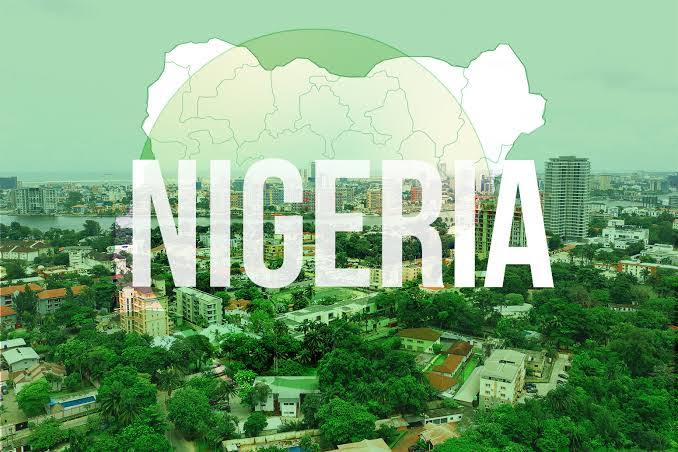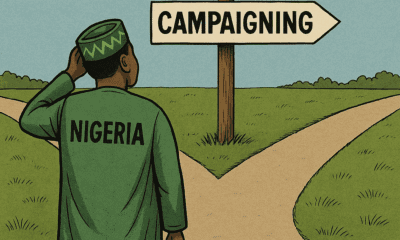National Issues
When Twelve Governors Hold the Temperature of a Nation: The Urgent Need for Them and Shettima to Engage Directly in the Sharia Belt to Stabilize Nigeria -By Psychologist John Egbeazien Oshodi
The twelve Sharia states — Bauchi, Borno, Gombe, Jigawa, Kaduna, Kano, Katsina, Kebbi, Niger, Sokoto, Yobe, and Zamfara — share more than a legal framework. They share a psychological and spiritual ecosystem. Their populations are tied by language, faith, trade routes, migratory patterns, kinship networks, and shared histories of both suffering and resilience. When one state bleeds, the others do not simply watch; they absorb the emotional shock in their own way.

Nigeria is entering one of the most volatile, emotionally destabilizing, and historically defining moments of its democratic life. What we are witnessing now is not just another cycle of insecurity or another wave of political tension. It is a convergence of fear, disbelief, and exhaustion in the hearts of ordinary people. Across the northern Sharia belt, the sense of safety has been replaced by a permanent nervousness, a quiet trembling that now sits inside families, schools, markets, roads, and places of worship. The mass abduction of more than three hundred schoolchildren and a dozen teachers in Niger State was not just a crime; it was a psychological blow that penetrated the soul of a region already stretched by years of violence.
This single event in Niger did something that official statements could not undo. It sent a message to every parent in the North that the distance between their child and danger is now paper-thin. From Kebbi to Zamfara, from Kaduna to Kano, families watched the news and silently asked themselves, “If they could take hundreds at once, who is really safe?” Days later, when twenty-five schoolgirls were abducted in Kebbi State and a teacher murdered, the message hardened into reality. And when worshippers were killed and thirty-eight congregants were abducted in a church attack in Kwara, the fear that had been spreading across the Sharia belt deepened further into something close to despair.
In the midst of this growing sense of vulnerability, the twelve Sharia-state governors have remained largely quiet. Their posture has been one of controlled, careful silence. But when a people start to experience their leaders’ silence as emotional absence, that silence becomes part of the crisis itself. This is where the Sharia belt now stands.
The Silence That Can No Longer Hold the Region Together
For many years, silence was the unofficial language of governance in much of the Sharia belt. It was not simply weakness; it was a deliberate survival tool. In a region where governors must constantly navigate between religious authorities, political godfathers, traditional institutions, and a watching federal government, silence often felt safer than open confrontation. Speaking too firmly risked offending powerful clerics. Moving too boldly risked unsettling fragile alliances. Questioning religious institutions risked being labeled as anti-Islam. And so, silence became a kind of political lubricant — smoothing over tensions, postponing conflicts, and giving the appearance of calm even when the ground was shifting underneath.
But silence has an invisible expiry date. When the magnitude of pain rises beyond a certain level, silence stops being read as caution and starts being read as indifference. That is what is happening today. After the Niger mass kidnapping, parents did not just wait for statements; they waited for visible emotional engagement from their leaders. They wanted to see governors leave their comfort zones and stand in front of the people in real sorrow and resolve. Instead, many heard only routine remarks and saw little genuine behavioral shift.
Silence, which once protected these twelve governors, is now exposing them as emotionally distant from the people they claim to serve. The more insecurity grows, the more this silence is interpreted as a kind of emotional abandonment. And abandonment is a dangerous feeling for a people already under trauma; it creates anger beneath the fear, and anger beneath fear is what eventually turns into unrest, resentment, and deep distrust of institutions.
At this stage, silence is not neutral. It is a message. And the message many hear now is: “You are largely on your own.”
The Sharia Belt’s Emotional Ecosystem
The twelve Sharia states — Bauchi, Borno, Gombe, Jigawa, Kaduna, Kano, Katsina, Kebbi, Niger, Sokoto, Yobe, and Zamfara — share more than a legal framework. They share a psychological and spiritual ecosystem. Their populations are tied by language, faith, trade routes, migratory patterns, kinship networks, and shared histories of both suffering and resilience. When one state bleeds, the others do not simply watch; they absorb the emotional shock in their own way.
A kidnapping in Niger does not remain a Niger problem. It becomes a northern fear. A killing in Zamfara does not remain a Zamfara headline. It becomes part of a wider narrative of helplessness. A blasphemy-related riot or lynching in Sokoto does not remain a Sokoto incident. It becomes a symbol that informs how people in Yobe, Katsina, and Kaduna think about justice, faith, and their place in the Nigerian union.
This ecosystem works like a series of emotional mirrors. Each state reflects something back to the others. When one governor appears weak or silent, others may also retreat, believing that maintaining low visibility is the safest path. But when insecurity becomes systemic, this collective caution turns into a collective paralysis. People no longer feel that the region is guided by leaders who can respond decisively when the ground is shaking.
This is why we cannot discuss Niger State in isolation, or Kebbi in isolation, or Sokoto in isolation. The Sharia belt reacts as one nervous system. And right now, that nervous system is overstimulated, fearful, and unsure whether its guardians are still willing or able to protect it.
The Hisbah–Blasphemy Contradiction They Can No Longer Escape
Now we come to one of the most sensitive and controversial realities in the region: the role of the Hisbah religious police and the broader enforcement of Sharia-related moral codes. For years, Hisbah has been empowered to regulate the personal and social behavior of residents — intervening in matters of clothing, mixing of genders in public spaces, alcohol consumption, nightlife, and various expressions of youth culture. Hisbah has also been closely associated with the enforcement climate around blasphemy.
At the same time, the most basic right — the right to life and security — is being violated on a massive scale by kidnappers, bandits, and violent groups. When communities see heavy emphasis on moral offenses, but weak protection against existential threats, a painful psychological contradiction emerges.
Ordinary people are now asking blunt questions in private and sometimes increasingly in public. They are asking why Hisbah can mobilize quickly to shut down a music concert, yet the same level of speed is not visible when armed men invade villages. They are asking why youths can be arrested for what they wear or what song they play, but those who abduct and murder children seem to vanish into forests with little consequence. They are asking why blasphemy allegations move through social and legal responses faster than the pursuit of those who slaughter innocent people.
It is important here for me to be clear about my own stance. As a psychologist and as an observer of religious, cultural, and legal systems, I am not against Sharia. Sharia, in these twelve states, is part of a long-standing spiritual and cultural identity. It shapes personal law, family life, and a sense of moral obligation. My concern is not with the existence of Sharia, but with the imbalance between how quickly moral matters are enforced and how slowly or inadequately life-threatening crimes are confronted. The region is now facing a global environment where human-rights expectations, international treaties, and external scrutiny—especially from the United States and other democratic nations—are looking directly at how Sharia-linked systems operate in practice.
The truth is that reality has changed. The Sharia belt is no longer observed only by its own citizens and local scholars. It is being observed by international institutions measuring how well religious legal systems coexist with fundamental human rights, especially the right to life, dignity, and fair process. The governors can no longer pretend that this global lens does not exist.
Deborah Yakubu: The Unfinished Justice Standing at the Center of Global Scrutiny
In this complex intersection of Sharia, Hisbah, insecurity, and global human-rights standards, one name continues to surface as a painful, unresolved test of moral and legal integrity: Deborah Yakubu.
Deborah was a young Christian student in Sokoto, allegedly accused of blasphemy by some of her classmates. What followed was not a judicial process, not a measured community dialogue, not a peaceful intervention. It was a mob killing. She was dragged, beaten, and murdered in broad daylight on school grounds. Her body was set on fire as others watched, recorded, and celebrated. Videos of her killing circulated, not in secret, but with boldness, as if those involved believed that nothing serious would ever happen to them.
For many in Nigeria and across the world, this moment became a symbol — not just of religious extremism, but of institutional failure. The fact that many of the perpetrators were not properly held accountable sent a message that mob justice, when wrapped in the language of blasphemy, might be tolerated or quietly overlooked. This is not just a legal stain; it is a psychological wound for the nation.
Some of the twelve governors may want the memory of Deborah’s killing to fade. They may prefer that it remains a painful chapter that is never reopened. But human-rights organizations, international observers, and voices in Washington have not forgotten. Her case appears in reports, submissions, and background briefings. When foreign institutions look at the Sharia belt, they do not only see court structures or legal codes; they see Deborah’s burning image and ask whether this region can deliver justice even when a mob cries blasphemy.
For northern Nigeria to reclaim moral and political credibility, the Deborah Yakubu case must be revisited. Reopening her case is not about attacking Sharia. It is about reasserting that no interpretation of Sharia justifies mob killing, that no accusation of blasphemy cancels due process, and that no society can call itself just when a young woman is murdered on camera and the system looks away.
The twelve governors, especially those in Sokoto and neighboring states, must understand that reopening Deborah’s case is now part of their responsibility to the living and to the dead, to God and to humanity, and to their own reputations in a watching world.
Why Shettima Must Step In Now
In this wide and painful landscape — mass kidnappings, fragile silence, Hisbah contradictions, Deborah’s unresolved death, and gathering human-rights pressure — one figure stands out as uniquely positioned to intervene: Vice President Kashim Shettima.
Shettima is not an outsider to northern pain. He governed Borno during years when Boko Haram turned schools into battlefields and markets into graveyards. He saw first-hand what it means for a population to be psychologically battered by fear, uncertainty, and helplessness. He understands the mental and emotional damage that follows government inaction. He knows that once people stop believing that their leaders can protect them, it becomes difficult to rebuild that belief.
He also understands the internal dynamics of the Sharia belt. He knows the language of its clerics, the anxieties of its governors, the pride of its traditional rulers, and the underlying sense of marginalization that has long shaped northern responses to federal authority. Unlike many, he can speak firmly without being easily dismissed as an external enemy of the faith or a hostile southern voice.
Shettima’s role at this moment cannot be limited to ceremonial speeches or quiet appearances at state functions. He must become the central northern mediator between reality and denial. He must visit Niger, Kebbi, Sokoto, Zamfara, Kano, and the other Sharia states not just as an emissary of the presidency, but as a northern son calling his brothers and colleagues into accountability. He must help them see that the old strategies of silence, behind-the-scenes bargaining, and external blame are no longer enough.
He must encourage them to redesign their approach to security, not in opposition to Sharia, but in alignment with its own higher ethical principles: the protection of life, justice, and communal well-being. He must help them recognize that facing the Deborah Yakubu case again is not surrender to foreign pressure but an attempt to align their governance with both faith and humanity.
International Pressure Has Shifted the Ground Beneath Their Feet
In previous years, events in the Sharia belt could be treated largely as local or national issues. Today, that era is gone. The actions and inactions of the twelve governors are now being discussed in international human-rights forums, in U.S. congressional hearings, and in policy circles where decisions about foreign aid, military cooperation, and diplomatic posture are made.
Lawmakers and analysts abroad are asking why Nigeria’s northern states appear more efficient at enforcing dress codes or shutting down social activities than at preventing mass kidnappings and church attacks. They are asking why blasphemy accusations seem to trigger faster social response than the killing of innocent civilians. They are asking why a case like Deborah Yakubu’s appears closed while new victims of violence appear almost every week.
This international pressure is not going away. In fact, it will intensify as more information, more reports, and more testimonies surface. Whether the governors like it or not, their decisions are now part of a global conversation about religious freedom, minority rights, and the compatibility of Sharia-based governance with universal human-rights norms.
They can respond in two ways. They can retreat into defensive rhetoric, insisting that outsiders do not understand their culture or their faith. Or they can step forward, acknowledge where things have gone wrong, and demonstrate that their leadership is capable of protecting both religious identity and human dignity.
The second path is the only one that can stabilize the region in the long term.
A Region Approaching Emotional Collapse
From a psychological perspective, the Sharia belt is showing signs of what can be described as emotional fatigue or even collective burnout. This is what happens when a population faces repeated shocks — kidnappings, killings, religious controversies, political disappointments — without seeing corresponding signs of healing or justice.
Parents are tired of living with the constant fear that their children may not return from school. Young people are tired of being seen as moral suspects while they themselves feel unprotected from violence. Clerics are torn between maintaining doctrinal purity and responding to the cries of their communities. Security forces are often under-resourced, overwhelmed, and caught between political instruction and ground realities. Governors are stressed but, in many cases, emotionally withdrawn.
When this kind of exhaustion sets in, societies start to become numb. Numbness is not peace; it is a warning sign. It means that people are beginning to emotionally disconnect from their own state and its institutions. They stop expecting protection. They stop expecting justice. They stop expecting truth. That is a dangerous trajectory, because once people mentally detach, it becomes much harder to rebuild trust in leadership.
This is why the twelve governors must not misread the current calm as acceptance. Much of the region’s quiet is not calm; it is emotional fatigue. And fatigue can quickly turn into disillusionment.
Nigeria Needs Shettima Now — But the Governors Must Move First
This is why, in this moment of converging pressures, Nigeria needs Kashim Shettima not just as vice president, but as a catalyst for responsibility among the twelve Sharia-state governors. He can open the doors, but they must walk through them. He can convene the meetings, but they must speak with courage. He can remind them of their duty, but they must finally act beyond silence.
These governors can no longer govern only from council chambers and press releases. They must go down to the roots of the problem. They must sit with the imams whose sermons shape young minds. They must speak with elders in villages where extremist ideas are whispered and normalized. They must meet the families in whose homes some of these boys are radicalized long before they pick up weapons. They must look into the eyes of those who quietly cheer violence in the name of religion and tell them the era of silent approval is over.
They must also walk into the courts and speak directly with Sharia judges. They must press for a clearer separation between genuine faith and mob emotion. They must insist that no interpretation of Sharia can justify lynching, burning, or collective punishment. They must demand that cases like Deborah Yakubu’s are not buried but reopened, examined, and judged with justice rather than fear.
And they must call in the Hisbah Police, not just to enforce dress codes or public morality, but to confront how their mandate is understood. They must tell Hisbah leaders that the protection of life is the highest moral law, that their legitimacy depends on safeguarding people from violence as much as regulating conduct, and that collaboration with security agencies against kidnappers and killers is now non-negotiable.
Shettima’s role is to bring them into one room, to break the old habit of silence, and to tell them plainly that the world has changed around them. But the real work belongs to the governors themselves. They must become the ones who stand in front of their people and say: we will talk to our imams, our elders, our judges, our Hisbah, our families, and we will no longer pretend that these problems come from nowhere.
Nigeria is trembling.
The Sharia belt is exposed.
Niger is wounded.
Kebbi is shaken.
Sokoto is haunted.
The world is watching.
And the twelve governors are out of time.
This is their moment to act — with Shettima beside them, but with their own signatures on the decisions — for the sake of the North, for the sake of the nation, and for the sake of the generations that will ask what they did when the region was on the edge.
About the Author
Prof. John Egbeazien Oshodi is an American psychologist and educator with expertise in forensic, legal, clinical, cross-cultural psychology, public ethical policy, police, and prison science.
A native of Uromi, Edo State, Nigeria, and son of a 37-year veteran of the Nigeria Police Force, he has dedicated his professional life to bridging psychology with justice, education, and governance. In 2011, he played a pioneering role in introducing advanced forensic psychology to Nigeria through the National Universities Commission and Nasarawa State University, where he served as Associate Professor of Psychology.
He currently serves as contributing faculty in the Doctorate in Clinical and School Psychology at Nova Southeastern University; teaches across the Doctorate Clinical Psychology, BS Psychology, and BS Tempo Criminal Justice programs at Walden University; and lectures virtually in Management and Leadership Studies at Weldios University and ISCOM University. He is also the President and Chief Psychologist at the Oshodi Foundation, Center for Psychological and Forensic Services, United States.
Prof. Oshodi is a Black Republican in the United States but aligns with no political party in Nigeria—his allegiance is to justice alone. On the matters he writes about, he speaks for no one and represents no side; his voice is guided solely by the pursuit of justice, good governance, democracy, and Africa’s advancement. He is the founder of Psychoafricalysis (Psychoafricalytic Psychology)—a culturally rooted framework that integrates African sociocultural realities, historical awareness, and future-oriented identity. A prolific thinker and writer, he has produced more than 500 articles, several books, and numerous peer-reviewed works on Africentric psychology, higher education reform, forensic and correctional psychology, African democracy, and decolonized models of therapy.










